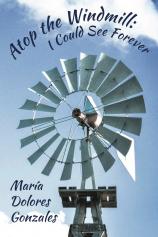Atop the Windmill, I Could See Forever
Review
Atop the Windmill, I Could See Forever
A childhood in the American southwest is brought to life by author and linguist María Dolores Gonzales in this sparkling, bilingual memoir.
The year before she was born, María’s parents were living on what seemed to be an idyllic ranch in northeastern New Mexico, but a massive flood destroyed that paradise forever, forcing a move. In 1946, María was born in what could only be described as miraculous circumstances, as her mother, laboring for days, prayed she would not die. She was named for her grandmother, but also in honor of La Virgen, who, her mother always believed, answered her prayers.
"ATOP THE WINDMILL, I COULD SEE FOREVER will be a distinct treasure for those who, like [Gonzales], have experienced the joys and occasional complications of existence in a dual culture, while introducing those special dynamics to a new audience."
Such remarkable --- sometimes uplifting, sometimes fraught --- incidents are sprinkled throughout the narrative: mother and children being serenaded by Mariachis the day they departed after spending time with their father, who had taken a job in Mexico; his perilous walk home through a horrific blizzard; María’s mother “learning” to drive when she and her daughters were stranded on the highway; and her sudden offer of a teaching job when the family was on the brink of financial collapse.
Smaller details are equally charming. Though early explorers found them oppressive, a vast sea of trackless grass, María loved the “staked plains” --- El Llano Estacado --- where the family took up residence for six years while her mother taught at the one-room school in Rosebud. When she could, the girl would climb to the top of an old windmill and, surveying the landscape, dream “of places I wanted to go when I grew up.”
Admonished by strict nuns to speak only English from age five, María grew up bilingual. Though her parents were Americans whose forebears had moved to the New Mexico region in the 1700s, they were often unthinkingly referred to as Spanish, Mexican or “dirty Mexican.” María’s mother attained a college degree and considered her teaching ability a way of giving back to her community. Her daughter clearly inherited both the talent and the sentiment, receiving a doctorate in Spanish sociolinguistics and establishing the Bilingual Strategies Language Institute. One of the most engaging features of these emotive vignettes is the manner in which María has interwoven Spanish and English into conversation and narrative, writing it as she must often have heard it spoken. This can provide a language lesson for those who speak either, or both, idiomas.
María Gonzales means to preserve her heritage, lore and Spanish, her mother tongue. ATOP THE WINDMILL, I COULD SEE FOREVER will be a distinct treasure for those who, like her, have experienced the joys and occasional complications of existence in a dual culture, while introducing those special dynamics to a new audience.
» Click here to purchase the book.
Reviewed by Barbara Bamberger Scott on November 13, 2020
Atop the Windmill, I Could See Forever
- Publication Date: September 1, 2020
- Genres: Memoir, Nonfiction
- Paperback: 160 pages
- Publisher: Lithexcel
- ISBN-10:
- ISBN-13: 9781944293499




